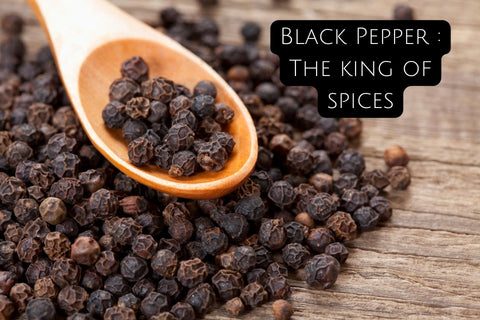Black Pepper, scientifically known as Piper nigrum, is a common spice made of dried and ground peppercorns, the fruit of the pepper plant. It has a strong, pungent flavor and is widely used in cooking to add spice and depth to a variety of dishes.
Why Black Pepper is designated as the king of spices?
Historical Significance: Black pepper has a rich history, once considered a precious commodity and even used as currency in some societies. Its role in the spice trade has left an indelible mark on global history.
Universal Appeal: Black pepper is one of the most commonly used and traded spices worldwide, found in kitchens across diverse cultures. Its spicy, pungent flavor makes it a fundamental seasoning.
Enhancing Flavor: Beyond its spiciness, black pepper enhances the flavors of other ingredients in dishes. It has a unique ability to elevate the taste of various foods.
Health Benefits: Black pepper contains compounds like piperine that offer potential health benefits, including antioxidant properties and improved nutrient absorption.
Cultural Significance: Black pepper has a central role in the cuisines and cultures of numerous regions, contributing to a wide range of culinary traditions.
Black Pepper Types:
Black pepper comes in several different types, each with its unique characteristics and processing methods. The primary types of black pepper include:
Tellicherry Pepper:
Tellicherry pepper is considered one of the finest types of black pepper in the world. It is named after the city of Tellicherry (now Thalassery) in the Indian state of Kerala. Tellicherry peppercorns are larger and have a bold, robust flavor with citrusy and floral notes.
Malabar Pepper:
Malabar pepper is another high-quality black pepper variety from the Malabar Coast of India. It is known for its fruity and aromatic flavor profile. Malabar peppercorns are typically smaller and have a milder heat compared to Tellicherry pepper.
Lampong Pepper:
Lampong pepper comes from the Indonesian island of Sumatra, specifically the region of Lampung. It has a unique and complex flavor with hints of fruitiness and a medium heat level. Lampong pepper is often used in Indonesian cuisine.
Sarawak Pepper:
Sarawak pepper is grown in the Malaysian state of Sarawak on the island of Borneo. It has a mild and slightly sweet flavor with a pleasant heat. Sarawak pepper is known for its clean and aromatic taste.
Vietnamese Pepper:
Vietnam is a significant producer of black pepper, and its peppercorns are known for their spiciness and earthy flavor. Vietnamese black pepper is commonly used in both local and international cuisines.
Brazilian Pepper:
Brazil also produces black pepper, and Brazilian peppercorns are characterized by their intense heat and sharp flavor. They are often used in regional Brazilian dishes.
Kampot Pepper:
Kampot pepper is grown in the Kampot and Kep regions of Cambodia. It is known for its complex flavor profile, which includes floral, fruity, and spicy notes. Kampot pepper has received recognition as a Geographical Indication (GI) product.
Wild Pepper:
Some varieties of black pepper are harvested from wild vines rather than cultivated plants. These wild peppers can have a more irregular appearance and a unique flavor profile influenced by their natural environment.
Mixed Black Peppercorns:
Some blends and mixes of black pepper include a combination of different peppercorn types. These blends can offer a balanced and nuanced flavor.
Black pepper benefits and uses:
Black pepper offers a range of benefits and has numerous culinary and non-culinary uses. Here are some of its benefits and uses:
Culinary Uses:
Flavor Enhancer:
Black pepper is primarily used as a spice to enhance the flavor of various dishes. It adds a spicy and pungent kick to savory foods, making them more appetizing.
Seasoning:
Ground black pepper is a common seasoning for a wide range of dishes, including soups, stews, sauces, marinades, and salads.
Table Condiment:
Ground black pepper is often placed on dining tables as a condiment for individuals to season their food according to their taste.
Ingredient in Spice Blends:
Black pepper is a key ingredient in many spice blends, such as curry powder, garam masala, and five-spice powder, contributing to their complex flavor profiles.
Health Benefits:
Antioxidant Properties:
Black pepper contains antioxidants, including piperine, which may help protect cells from damage caused by free radicals.
Enhanced Nutrient Absorption:
Piperine in black pepper has been shown to enhance the absorption of certain nutrients, such as curcumin from turmeric and beta-carotene from carrots.
Anti-Inflammatory Effects:
Some studies suggest that piperine in black pepper may have anti-inflammatory properties, which could be beneficial for conditions involving inflammation.
Digestive Aid:
Black pepper is believed to stimulate the production of digestive enzymes, potentially aiding in digestion and reducing digestive discomfort.
It's important to note that while black pepper offers various potential health benefits, its consumption should be in moderation, especially for individuals with certain medical conditions.
precautions with pepper 
Certainly, here are some precautions to keep in mind when using black pepper:
Moderation: Use black pepper in moderation, as excessive consumption can lead to gastrointestinal discomfort in some individuals.
Medication Interactions: Black pepper contains piperine, which can enhance the absorption of certain medications. Consult your healthcare provider if you are taking medication with narrow therapeutic ranges.
Sensitive Stomach: If you have a sensitive stomach or conditions like GERD or gastritis.
Pregnancy and Breastfeeding: While black pepper is generally safe in cooking during pregnancy and breastfeeding, consult a healthcare provider for personalized advice.
Children: Use black pepper in moderation when preparing dishes for children, as it can be too spicy for their taste.
Dental Issues: Ground black pepper can sometimes get stuck in dental work, so consider the coarseness of the pepper or opt for pre-ground pepper if you have dental issues.
Quality and Freshness: Use freshly ground black pepper for the best flavor and aroma. Store it in a cool, dark place in an airtight container to maintain its quality.
Spice Blends: Be cautious when using spice blends that contain black pepper, as the overall spiciness can vary. Adjust the amount to suit your taste.
Food Safety: Practice good food safety by storing black pepper and other spices away from moisture and contaminants to prevent spoilage.
summary
Black pepper comes in various varieties, each with its unique taste profile, such as Tellicherry, Malabar, Lampong, and Sarawak pepper. Beyond its culinary uses, black pepper offers potential health benefits due to compounds like piperine, including antioxidant properties and enhanced nutrient absorption. It has a rich history, having been highly valued in ancient times and playing a central role in global spice trade routes. Today, black pepper continues to be a crucial ingredient in a wide range of savory and sweet dishes, earning its title as the "King of Spices."




Comments (0)
There are no comments for this article. Be the first one to leave a message!